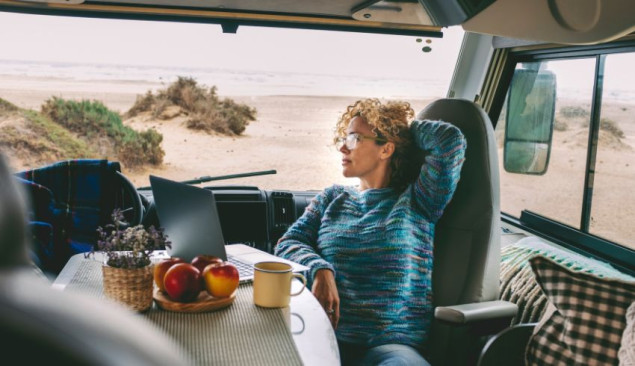Safaris in Tanzania, beach days in Thailand, and all-year sunshine in Cyprus… Linda Whitney meets the franchisees seeing the world’s wonders while making a living
How would you like to roam the world while still making money?
This sounds like a dream reserved for A-listers, but with the right kind of business, anyone can do it. Over the past few years, digital nomadism – a lifestyle that enables travel and work – are becoming much more mainstream. In 2022, there were estimated to be 35 million digital nomads operating worldwide.
I count myself among these as a freelance journalist working while travelling between Europe and Turkey. A lack of distractions means you’re more focused on work but also have time to really enjoy life.
Most of this nomad population work in IT (19%) while the second most popular field is creative services (10%). However, there are also plenty of people in education and training, consulting and research, sales, marketing, PR, finance and accounting.
Many franchise models in these industries can be run from anywhere as long as you have access to your laptop, smart phone, and decent wi-fi.
In fact, 66% of all digital nomads have their own businesses – some of which will almost certainly be franchises. So, what are you waiting for?

Becoming a digital nomad with a franchise
If you’ve been enticed by digital nomadism, the first place to start is to find a franchise that can be run from anywhere. Look for those that you can run on your own, delivering services such as website creation, marketing, business services, online sales, recruitment, or online tutoring. Some management franchises, where you manage the business and employ a team of people to deliver the services in the UK, may also be suitable.
Make sure the business you choose inspires you – travelling while running a business can bring extra pressures so you must love the brand enough to persevere in tough times.
Also be prepared to put in time before you hop on a plane. Every franchise requires training and a franchisor will often want to be assured that you can run the business profitably before you leave the UK.
Practical aspects
When travelling, communications becomes all-important, which means it’s essential to choose the right communications package for you. For example, if you don’t ensure international calls are covered within your package, you could receive an expensive bill.
Many hotels offer free wi-fi (check the reviews first though – some charge and in others the connection is very poor), and some city centres also offer free public wi-fi access so you can work in the park. Cafes regularly offer wi-fi access to paying customers, but this can get expensive as they often expect you to buy multiple drinks.
Many mobile comms providers shout about their roaming packages which charge a few pounds daily but even £5 a day adds up to about £150 a month, and some have call and data limits. Check what’s on offer by using comparison sites like MoneySupermarket, which offers a good summary of roaming charges. If you shop around, you may find business deals.

Visas
Of course, going abroad throws the question of visas into the mix. A standard tourist visa will usually grant you 90 or 180 days in a country, but whether you’re able to work within this time will be dependant on the country, so check the rules.
In response to the growing rise of working tourists, many countries are now administering Digital Nomad Visas, which may give you the right to stay longer while earning money. The site Global Citizen Solutions details the 43 countries offering digital nomad visas as of late 2023.
Tax
If you’re away longer than 183 days in one tax year, you’ll lose UK tax residency, which means you could be liable to tax in the country you are in. Once you’ve worked out where you’re planning on heading, conduct some research around tax laws as they vary drastically between regions.
Finally, don’t forget you need international travel and health insurance (some bank accounts provide this) and the capacity to make international payments.
Taking multiple short trips

“My favourite place so far is Tanzania, where I took a safari, and there were elephants and zebra strolling around our jeep,” says Abbie Akinfenwa. She’s the Loughton, Essex franchisee with Pink Spaghetti, a virtual assistant service, but combines running her business with around eight overseas holidays a year.
This year she’s been to Switzerland, Singapore, Thailand, Canada, the USA, Zanzibar and Morocco, juggling sightseeing with working on her laptop. Abbie has 21 clients, of which around nine require daily tasks such as emails, but mainly she provides monthly social media posts for them all.
“I never go anywhere without good wi-fi, and my trips are around 10 days or less. I’m always available on email and don’t make phone calls unless it’s essential. I limit my services so as to avoid very techy or financial tasks while abroad and if I need to speak to someone, I call on Zoom,” she says. “WhatsApp is brilliant too.”
Currently, she has a team of three part-time staff working from home in the UK to help her.
“I don’t think working from abroad costs any more than in the UK, and I’m just as efficient – in fact I find that I’m more focused – and it doesn’t affect my income. It works for me,” says Abbie.
Setting up residency abroad
_med_resRS.jpg)
Marietta Maidman used to work in the cruise sector but now she runs her own travel business as a franchisee with Not Just Travel. She started the franchise when she lived in Portsmouth but now lives in Cyprus, where she can still run her business as usual. On the wet and windy November day I called her, it was 28 degrees in Cyprus, which makes it easy to see the appeal of working abroad.
“You can run this franchise from anywhere,” says Marietta. “Cyprus is two hours ahead of the UK, so I have time to plan my day. I specialise in sustainable travel, so I like to research sustainable hotels and relevant travel offers for my clients and arrange marketing personalised to them.”
Marietta uses a Voice over Internet Protocol (VoIP) service to call clients at a monthly cost of £12. There are no call charges and clients calling her Portsmouth number are seamlessly forwarded to her mobile, regardless of her location: “They don’t have to pay for an international call, and they can’t tell that I’m not in England.”
Marietta has international roaming installed on her mobile phone and says: “Despite Brexit, this is still available at the same rates as in the UK.” For local calls she has installed a Cypriot eSIM card on her phone which costs just £4 a month plus call charges.
For international banking she uses a Revolut prepaid banking card, which allows her to run accounts in both Sterling and Euros, with good exchange rates and standing order facilities. “If you’re working while travelling, charges for international payments in terms of fees and exchange rates on most standard UK bank cards can be high.”
Marietta has a temporary residence visa for Cyprus, which means she can pay tax in Cyprus rather than the UK.
Splitting time between residencies

Gary Keating started business coaching with franchise, ActionCOACH, in Bristol in 2016. However, in winter he works from his house in Thailand.
“I spend approximately six to nine weeks in Thailand with my family. We recently bought a home in Croatia and spent four weeks there in the summer,” he says.
“Our general manager Jodie keeps things running in Bristol when I’m abroad, but as 90% of coaching is done via Zoom, it gives flexibility to coach anywhere in the world.
“The time difference is the only challenge. With Thailand there’s quite a big time difference, but luckily I’m a night owl and will be coaching until 2-3 am. It means I can spend the morning in my pool, smoking a cigar or meeting up with friends,” says Gary.
He advises others who are considering becoming digital nomads: “Find a place that you can see yourself being permanently. Thailand is a home from home. I have all my home comforts there - and always make sure there is good wi-fi.”
Author: Linda Whitney








_75_75_s.jpg)
_75_75.jpg)













_59_59_80_s.jpg)





